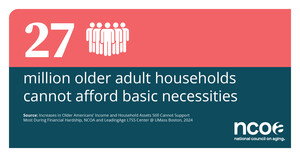NCOA Issues Statement on the 2012 Medicare Trustees Report
WASHINGTON, April 26, 2012 /PRNewswire-USNewswire/ -- The April 23 release of the Medicare Trustees Report provides an important opportunity to better understand the challenges the nation faces in strengthening and improving Medicare for the future.
(Logo: http://photos.prnewswire.com/prnh/20100615/NCOALOGO)
To inform the debate, the National Council on Aging (NCOA) has issued an analysis of five key facts that it believes must be understood and considered as policymakers look for solutions to keep Medicare strong for current and future older adults.
"We need to move beyond political spin and hyperbole to focus on the facts so that we can make informed, rational decisions about Medicare's future," says Howard Bedlin, NCOA Vice President for Public Policy and Advocacy. "In June, NCOA will become chair of the 68-member Leadership Council of Aging Organizations coalition (www.lcao.org) for one year. Protecting and strengthening the Medicare program will be a top priority during our term."
The 5 key facts include:
- Medicare "solvency" only applies to Part A Hospital Insurance (HI) and can be misleading.
It is untrue to state that Medicare will be "insolvent," "bankrupt," or "go broke" in 2024. There are four parts to the Medicare program (A, B, C, and D), and reports on solvency only apply to Part A Hospital Insurance. In 2024, 87% of Part A benefits could be paid for. Therefore, it is more accurate to state that in 2024 there will be a shortfall in the Medicare Part A Hospital Insurance Trust Fund. - The Trustees' projections on the Medicare Part A shortfall have varied widely over the past 40 years, and Congress has always taken action to ensure that the program continues to meet its obligations.
HI shortfall projections have ranged from four to 28 years since 1990, with the current projection falling in the middle. The Part A Trust Fund has never run out of money to meet its obligations and, in our view, it never will. - Growth in Medicare spending per person is not out of control and has—and will likely continue to be—below that of private insurance.
Per capita growth rates for common benefits have historically been lower for Medicare than for private health insurance. According to the Trustees Report, over the next five years (2012-2017), average per beneficiary HI costs are projected to grow by only 1.3% per year. These and other data demonstrate that the real problem is not Medicare spending growth, but overall health care sector cost growth. - The Affordable Care Act (ACA) is projected to reduce the future rate of growth in Medicare spending and delay the Part A shortfall by eight years.
But for the ACA, the projected Part A shortfall would occur in 2016, not 2024. The law made major strides to rein in Medicare spending—without cutting basic benefits or increasing out-of-pocket costs for the vast majority of beneficiaries—and should not be repealed. - Medicare beneficiaries currently spend a substantial portion of their incomes out-of-pocket on health services.
Medicare households spend three times more as a percent of income out-of-pocket for health care compared to non-Medicare households—14.7% vs. 4.9%. Median out-of-pocket costs for Medicare beneficiaries as a share of income increased from 12% in 1997 to an estimated 19% in 2011, and are projected to increase to 26% in 2020 under current law. The financial burden is highest for beneficiaries who are older, in relatively poor health, and have low or modest incomes.
For a deeper dive into NCOA's statement, and more facts around the current debate, please visit www.ncoa.org/Act.
About NCOA
The National Council on Aging is a nonprofit service and advocacy organization headquartered in Washington, DC. NCOA is a national voice for millions of older adults—especially those who are vulnerable and disadvantaged—and the community organizations that serve them. It brings together nonprofit organizations, businesses, and government to develop creative solutions that improve the lives of all older adults. NCOA works with thousands of organizations across the country to help seniors find jobs and benefits, improve their health, live independently, and remain active in their communities. For more information, please visit: www.ncoa.org | www.facebook.com/NCOAging | www.twitter.com/NCOAging
SOURCE National Council on Aging
WANT YOUR COMPANY'S NEWS FEATURED ON PRNEWSWIRE.COM?
Newsrooms &
Influencers
Digital Media
Outlets
Journalists
Opted In






Share this article